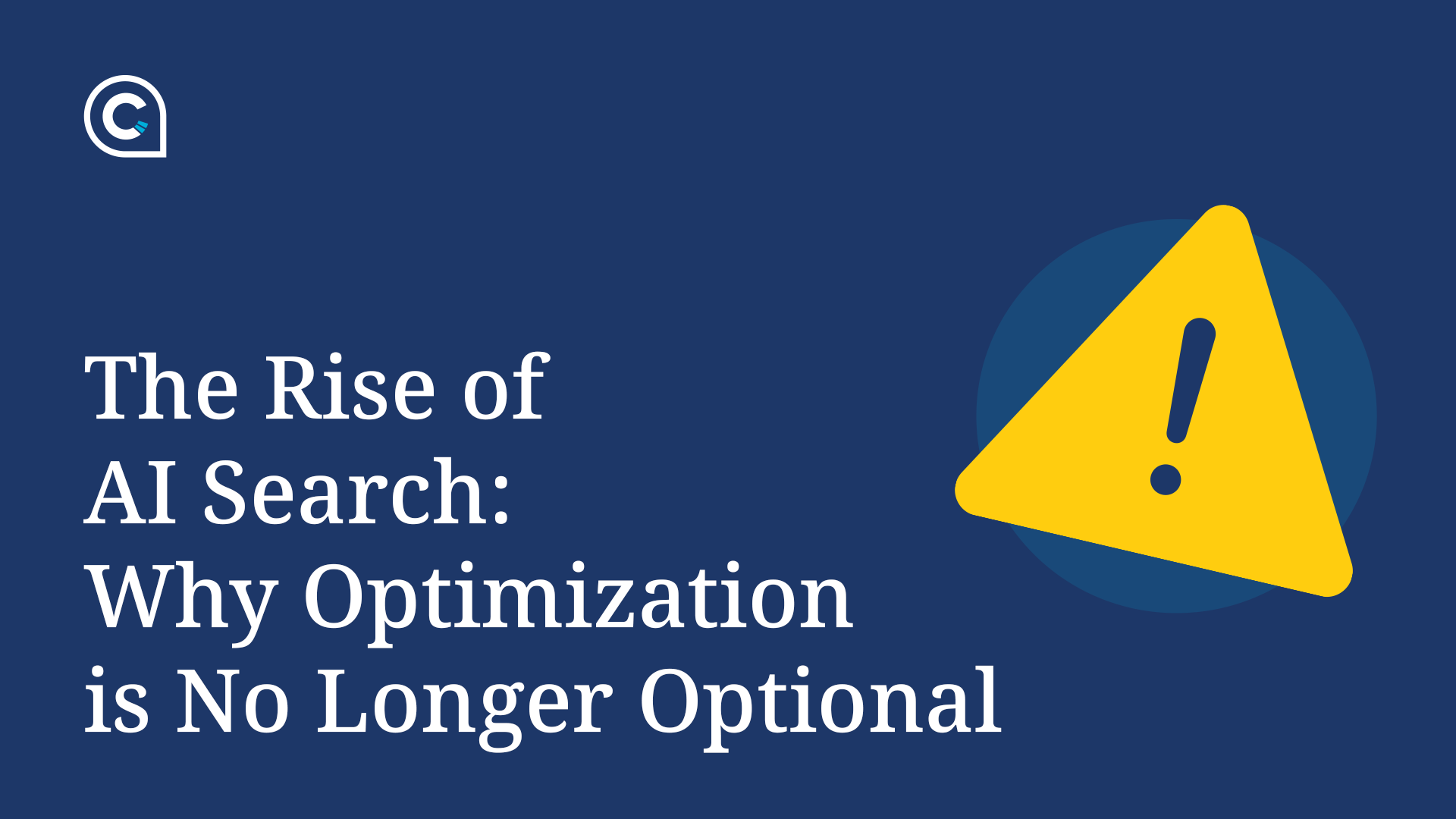
The Rise of AI Search: Why Optimization is No Longer Optional
Are you a small business owner, a non-profit marketer, or part of a SaaS organization’s marketing team? You’re probably looking to boost your online visibility. Well, AI search optimization is no longer a futuristic concept. It’s crucial now to make sure your content is ready for how people find information today.
Large language models (LLMs) like Gemini, Perplexity, and ChatGPT are changing everything. These tools are getting more popular and more functional, so let’s dive into what this means for you.
What’s the Big Deal with AI Search?
You’re used to traditional search engines. You type in some keywords, and you get a list of links. But AI search is different. It’s more about having a conversation. To understand this, let’s consider how traditional search engines work. They primarily rely on keyword matching. When you enter a query, the engine identifies web pages that contain those specific words. While this approach can be effective, it often falls short in capturing the nuances of human language and the user’s true intent.
AI search, on the other hand, leverages the power of LLMs to go beyond simple keyword matching. These models are trained on massive amounts of text data, enabling them to understand the relationships between words, the context of a query, and the underlying intent behind it. This allows for a more intuitive and conversational search experience. Think about it: instead of typing “best running shoes,” someone might ask an LLM, “What are the best running shoes for beginners with flat feet?”
LLMs can understand the intent behind these longer, more natural questions. They then provide users with direct, comprehensive answers, often pulling information from various online sources. This shift means we need to rethink how we create and optimize content.
Why Should You Care About AI Search Optimization?
Okay, so why should you, as a busy marketer or business owner, care about AI search optimization? The shift towards AI-powered search is not just a technological curiosity; it has profound implications for how businesses and organizations reach their target audiences. As LLMs become more integrated into our daily lives, they are increasingly influencing consumer behaviour and decision-making. Therefore, if you want to remain competitive and visible in the digital landscape, you need to adapt your strategies to align with this evolving search paradigm. Here’s the thing:
- LLMs Are Growing: People are using Gemini, Perplexity, and ChatGPT more and more. These tools are rapidly expanding their user base and capabilities, becoming go-to resources for information retrieval, product research, and even purchasing decisions. If your content doesn’t show up in these AI-powered searches, you’re missing out on potential customers or audience members.
- Search is Becoming Conversational: As I mentioned, people are using natural language. We’re asking questions the way we’d talk to a friend. This trend is driven by the increasing sophistication of LLMs, which are better equipped to understand and respond to natural language queries. Your content needs to provide those conversational answers.
- Direct Answers Matter: LLMs often give users a direct answer. This could be a short paragraph, a list, or a table. This format allows users to quickly obtain the information they need without having to click through multiple web pages. You want your content to be the source that the AI uses.
- Traditional SEO is Evolving: Even Google is using AI more. Search engines are continuously refining their algorithms to deliver more relevant and accurate results. This means that even if users are not directly using an LLM, your content will still benefit from AI search optimization. So, AI search optimization isn’t separate from traditional SEO; it’s becoming a core part of it.

How is AI Changing Content?
You might be wondering, “How is this AI stuff changing what I need to do?” The rise of LLMs is not only changing how users interact with search engines; it’s also revolutionizing the way content is created, consumed, and evaluated. AI-powered search is placing new demands on content creators, requiring them to prioritize quality, depth, and clarity. To succeed in this evolving landscape, you’ll need to adapt your content strategy to meet the expectations of both AI algorithms and human users. Here’s how:
- Quality is King (and Queen): LLMs prioritize content that demonstrates expertise, authority, and trustworthiness (E-A-T). They are designed to identify and surface the most reliable and informative sources. You can’t just throw a bunch of keywords on a page anymore. You need to provide real value.
- Depth and Breadth: LLMs have the capacity to analyze vast amounts of information and identify content that provides the most comprehensive and detailed coverage of a topic. To satisfy these demands, you should go deep on topics. Cover everything a user might want to know. Provide context, explain things clearly, and offer unique insights.
- Clarity is Crucial: LLMs are designed to process and understand information efficiently. To facilitate this process, you must make your content as clear and concise as possible. This means using straightforward language, avoiding ambiguity, and structuring your writing in a logical and easy-to-follow manner. Make your content easy to read. Use short sentences, clear headings, and simple language. Avoid jargon, or explain it if you must use it.
“To remain competitive in the evolving digital landscape, businesses must prioritize AI search optimization. It’s no longer a question of if but how to adapt.”
Optimizing for AI Search: A Practical Guide
Alright, let’s get into the nitty-gritty. How do you actually optimize for AI search optimization? Here’s what you need to do:
- Create Amazing Content: This is the most important thing. Focus on creating content that provides unique value, insights, and information. Make content that’s the best answer to a user’s question. Provide detailed information, and make it engaging.
- Write Like You Talk: Adopt a conversational tone that resonates with your target audience. Use a natural and engaging writing style that mirrors how people communicate in everyday conversations. Forget trying to sound like a robot. Write in a natural, conversational style. Use contractions (“you’re,” “it’s”) and everyday language.
- Structure for Success: Organize your content in a clear and logical manner, using headings, subheadings, and formatting elements to enhance readability. Use headings (H1, H2, H3), lists, and tables. This makes your content easier for both people and AI to understand. Consider using an FAQ section.
- Answer Questions Directly: Identify the questions that your target audience is most likely to ask and provide concise, accurate, and comprehensive answers within your content. Think about what questions your audience is asking. Then, provide concise, direct answers in your content.
- Use Schema Markup: Implement schema markup to provide search engines with additional context and information about your content. This structured data helps AI algorithms understand the meaning and purpose of your web pages, improving their ability to accurately index and rank your content. This is code that helps search engines understand your content. It might seem technical, but it’s worth it. For example, use FAQ schema for questions and answers.
- Build Topical Authority: Establish yourself as a credible and authoritative source of information on your chosen subject matter. Create a network of interconnected content that demonstrates your expertise and provides comprehensive coverage of relevant topics. Become an expert on your topic. Create a lot of related content that shows you really know your stuff.
- Optimize for Mobile and Voice: With the increasing prevalence of mobile devices and voice assistants, it’s crucial to ensure that your content is accessible and optimized for these platforms. People use their phones and voice assistants to search. Make sure your site is mobile-friendly and your content is easy to understand when spoken.

Keywords and Beyond
You still need to think about keywords, but not in the old way.
- Focus Keyphrase: Incorporate your primary keyword naturally and strategically throughout your content. Use “AI search optimization.” Use it naturally in your content, including in the first paragraph. And then use it a few more times.
- Semantic Keywords: Expand your keyword strategy to include related terms and concepts that provide additional context and relevance to your content. Think of words and phrases related to your main keyword. For example, “LLM optimization,” “AI content optimization,” and “voice search optimization.”
- Long-Tail Keywords: Target longer, more specific phrases that users are likely to use when conducting voice searches or seeking detailed information. These keywords often reflect a higher level of user intent and can help you attract a more qualified audience. These are longer, more specific phrases, like “how to improve AI search optimization for e-commerce.” They’re super important for voice search.
Make It Easy for AI
To really nail AI search optimization, you’ve got to make it easy for LLMs to understand your content. That means:
- Clear Context: Provide sufficient background information and context to help AI algorithms accurately interpret the meaning and purpose of your content. Avoid ambiguity and ensure that your writing is clear, concise, and easy to follow. Provide enough information so that an AI can understand what you’re talking about without any confusion.
- Structured Data: Implement schema markup to provide AI algorithms with a clear and structured representation of your content. This markup helps search engines understand the relationships between different entities and concepts on your web pages, improving their ability to index and rank your content effectively. Use those schemas! They help AI understand the meaning of your content.
- E-A-T: Demonstrate expertise, authoritativeness, and trustworthiness in your content. This signals to both users and AI algorithms that your information is credible and reliable. Back up your claims, cite sources, and show that you know your stuff.
Addressing Your AI Search Questions
You’re probably got some questions about all this AI search stuff. You might be thinking, “Okay, so what is AI search optimization, really?” Well, it’s all about making your online content as easy as possible for artificial intelligence (AI) to understand and use. This is super important if you want to show up when people are using LLMs like Gemini, Perplexity, and ChatGPT to find information.
And you might also be wondering, “Why should I, as a business owner, even care about AI search optimization?” That’s a great question! It’s because LLMs are becoming a major way people find stuff online. If you want to reach your audience, you’ve got to make sure your content is optimized for these AI-powered searches. You don’t want to miss out on potential customers, right?
The good news is that optimizing for AI search isn’t some crazy, complicated thing. A lot of it comes down to the same good content practices you should be following anyway. To optimize your content for AI search, focus on creating high-quality content that really answers people’s questions. Write in a way that sounds natural and conversational, and structure your content in a clear and easy-to-read way. Using schema markup can also help, and don’t forget to optimize for those long-tail keywords that people use in voice search.
In Conclusion
The way people search for information is changing. AI is here, and it’s changing how we find things. For small businesses, non-profits, and SaaS companies, AI search optimization is no longer optional. It’s how you’ll stay visible and reach your audience.
Need help optimizing for AI-driven search? Connect with our experts today.
Want to make your marketing decisions data-driven?
Talk to the marketing experts at Cyan today. Contact Us.

Discover what Cyan can do for you
We want to get to know you better so we can understand what services are going to help you meet your goals.